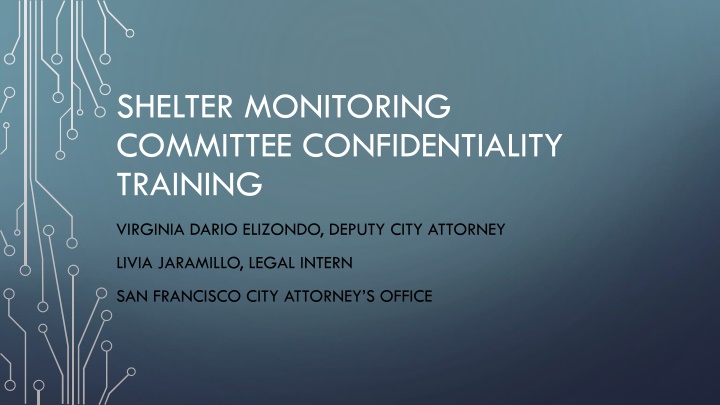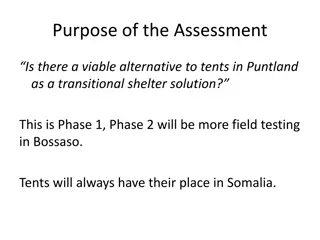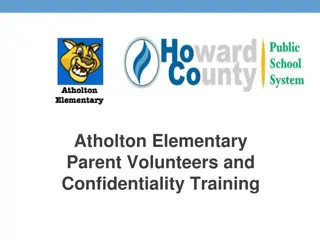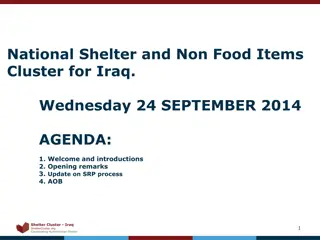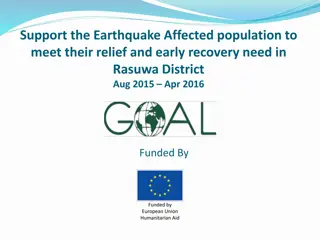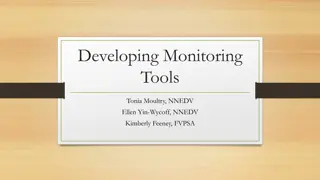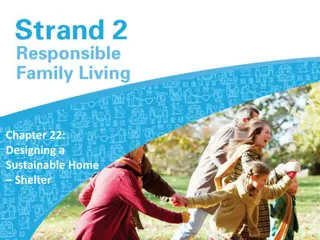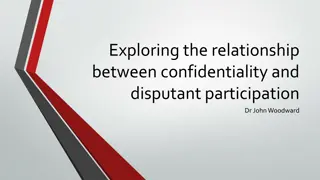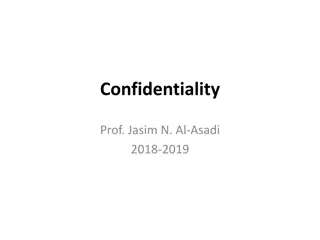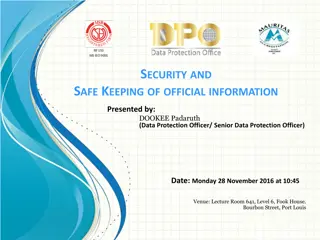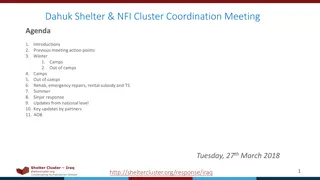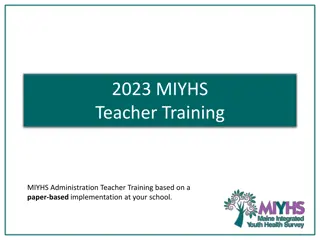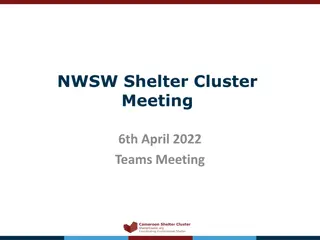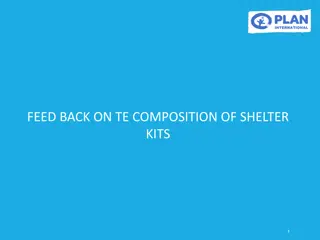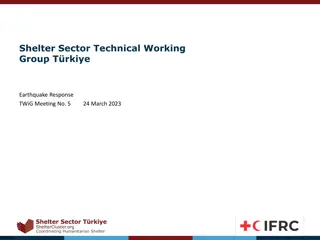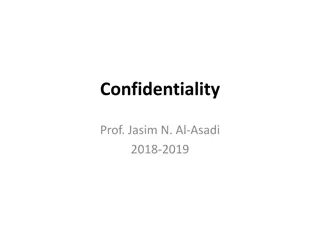Importance of Confidentiality in Shelter Monitoring Committee Training
Exploring the significance of confidentiality in the work of a shelter monitoring committee, this educational material delves into definitions of privacy, confidentiality, and personally identifiable information (PII). It emphasizes the critical role of confidentiality in building trust with the unhoused community, fostering honest feedback, and ensuring the quality assessment of shelters.
Download Presentation

Please find below an Image/Link to download the presentation.
The content on the website is provided AS IS for your information and personal use only. It may not be sold, licensed, or shared on other websites without obtaining consent from the author.If you encounter any issues during the download, it is possible that the publisher has removed the file from their server.
You are allowed to download the files provided on this website for personal or commercial use, subject to the condition that they are used lawfully. All files are the property of their respective owners.
The content on the website is provided AS IS for your information and personal use only. It may not be sold, licensed, or shared on other websites without obtaining consent from the author.
E N D
Presentation Transcript
SHELTER MONITORING COMMITTEE CONFIDENTIALITY TRAINING VIRGINIA DARIO ELIZONDO, DEPUTY CITY ATTORNEY LIVIA JARAMILLO, LEGAL INTERN SAN FRANCISCO CITY ATTORNEY S OFFICE
KEY DEFINITIONS: PRIVACY Privacy refers to an individual s right to control access to their personal information, but it also includes access to their body (such as collection of their biological specimens). Privacy is a subject s ability to control how other people see, touch, or obtain information about the subject. Violations of privacy can involve circumstances such as being photographed or videotaped without consent, being asked personal questions in a public setting, being seen without clothing, being observed while conducting personal behavior, or disclosing information about abortions, HIV status, illegal drug use, etc."
KEY DEFINITIONS: CONFIDENTIALITY Confidentiality refers to how private information provided by individuals will be protected by the researcher from release Confidentiality is an extension of the concept of privacy; it refers to the subject s understanding of, and agreement to, the ways identifiable information will be stored and shared. Identifiable information can be printed information, electronic information, or visual information such as photographs. Confidential information is any personally identifiable information (PII) - or information associated with it - about a person or establishment, collected under an assurance that restricts sharing the information.
KEY DEFINITIONS: PERSONALLY IDENTIFIABLE INFORMATION (PII) PII = data that can be used to identify, locate, or contact individuals or establishments, or reveal the characteristics or other details about them Direct identifiers: name, social security number or other information that is unique to an individual Indirect identifiers: include uncommon race, ethnicity, extreme age, unusual occupation and other details. Combined with other information, such as state or county of residence, or information available through other sources such as professional directories, direct or indirect identifiers can disclose a respondent's identity.
WHY IS CONFIDENTIALITY IMPORTANT TO THE SHELTER MONITORING COMMITTEE S WORK?
WHY IS CONFIDENTIALITY IMPORTANT TO THE SHELTER MONITORING COMMITTEE S WORK? Unhoused community faces stigma Promote trust between committee and the community it serves Promote honest feedback from community and thus more accurate assessment of the quality of shelters
SOURCES OF LAW: FEDERAL Homeless Management Information System (HMIS) Confidentiality and Privacy Requirements: the Department of Housing and Urban Development (HUD) imposes distinct requirements on PII contained in HMIS Online Navigation & Entry (ONE) System many people in shelters may be in this system Health Insurance Portability and Accountability Act (HIPAA): protects against the disclosure of patient health information (PHI) without consent by patient and/or healthcare institution Takeaway: The Committee must not access, collect, or report on PII or PHI
SOURCES OF LAW: STATE AND MUNICIPAL CA Constitution CA Welfare and Institutions Code San Francisco Admin Code Shelter Monitoring Committee Bylaws
STATE LAW CA CONSTITUTION, ARTICLE 1 DECLARATION OF RIGHTS, SEC. 1 All people are by nature free and independent and have inalienable rights. Among these are enjoying and defending life and liberty, acquiring, possessing, and protecting property, and pursuing and obtaining safety, happiness, and privacy.
STATE LAW CA WELFARE AND INSTITUTIONS CODE SEC. 10850 all applications and records concerning any individual made or kept in connection with the administration of public social services for which grants-in-aid are received by this state from the United States government shall be confidential Applies to SSI, TANF, Cal Fresh, MediCAL SEC. 17006 These records shall be confidential and shall not be open to examination or inspection, " Applies to CAAP (General Assistance)
SCOPE OF DATA COLLECTION SF ADMIN CODE SEC. 104.4. CONFIDENTIALITY AND PRIVACY Covered Departments, Contractors, and Grantees shall protect personally identifiable information regarding Clients' Sexual Orientation and Gender Identity from unauthorized disclosure, to the extent permitted by law and as required by the Health Insurance Portability and Accountability Act, the California Medical Information Act, Article 1 of the California Constitution, the California Health and Safety Code and regulations promulgated thereunder, the California Welfare and Institutions Code and regulations promulgated thereunder, and any other applicable provision of federal or state law.
SCOPE OF DATA COLLECTION SF ADMIN CODE SEC. 20.304. POWERS AND DUTIES (A) SITE VISITS The scope of the site visits shall be limited to gathering information relevant to: 1) health and safety conditions in shelters, 2) the adequacy of policies and procedures governing each facility, and 3) the treatment and personal experience of shelter residents in the shelters. Committee members shall conduct site visits in the least invasive manner possible and shall respect the privacy rights of shelter clients. Takeaway: Do NOT collect PII and/or health information
SHELTER MONITORING COMMITTEE BYLAWS SEC. 3 CONFIDENTIALITY All information contained in draft quarterly reports and a draft site inspection report is strictly confidential. However, once a team has approved a site inspection report and submitted it to the shelter or drop-in center/resource center it becomes public record. The Committee member is required to keep the names of homeless clients confidential in both reports and in discussions." Committee Members cannot discuss the location, date, or time of any unannounced visit with anyone outside their team or with staff. In addition, Committee Members must also follow all confidentiality rules as apply to site visits as stated in Ordinance 150-07, Section 20.304 (c). Takeaway: Do NOT share PII and/or health information in reports
EXAMPLE: HOW TO EXTRACT RELEVANT INFORMATION AND AVOID UNNECESSARY COLLECTION OF PII Interviewee: I am from nearby, Vallejo California. But I came to San Francisco a couple years ago. I actually have Late-Onset Pompe Disease so I moved into the city to be closer to my doctors. I became homeless last year and I feel unsafe at this shelter because they treat me differently because of my sexual identity. But I don t have any other option. I really hope to get out of here by my birthday though, which is coming up on August 27th, I ll be 28.
WHAT INFORMATION SHOULD BE COLLECTED FOR THE PURPOSES OF THE SHELTER MONITORING COMMITTEE? City of origin: Vallejo Personal medical information: Late-Onset Pompe Disease [rare disease] Sexual identity: Experienced discrimination at the shelter Date of Birth: August 27th, 1994
KNOWLEDGE CHECK: HOW INDIRECT IDENTIFIERS ADD UP TO IDENTIFICATION + City of Origin + Rare Disease Personal Identification + Sexual Identity + DOB
CONFIDENTIALITY BEST PRACTICES Introduce a consent form that informs interviewees on what the information collected will be used for and how it will be shared Collect sensitive information in private settings Limit the collection and recording of PII and PHI to information directly related to assessing shelter s quality MOST IMPORTANTLY: Do not collect or release PII or PHI in public reports or share with any persons outside of the committee
REVIEW CONFIDENTIALITY FORM Overview of terms and conditions Questions?
